- Home
- Alex Berenson
The Faithful Spy jw-1 Page 6
The Faithful Spy jw-1 Read online
Page 6
“Fine, Ellis. Then why’d you ruin my Saturday? So I could keep you company while we cross our fingers?”
“That’s exactly why.”
“Sorry,” she said.
“I’m the one who jumps to conclusions. You’re supposed to hold me back. All we know is that the flight number came across and a couple names match. It happens all the time.”
As usual, Shafer had put his finger on the real problem, Exley thought. This was the third serious alarm since January. Of course the agency was getting lazy. We let this one go to Dulles instead of making it land right away. Eventually we’ll just radio the pilot—“Hey, guy, you may have a couple hijackers on board, we’re not sure, have a nice day”—and let it go at that.
“This seems different. The way the flight number didn’t come through until the plane was up.” Exley shook her head. “I hate this.”
“What?”
“We have to be right every day. They only have to be right once.”
“Life isn’t fair,” Shafer said. He crossed his fingers. “Let’s go to my office, get an update.”
UNITED AIRLINES 919 had remained eerily quiet since the captain’s announcement an hour before, the hum of the ventilation system the loudest sound on board, aside from an endless stream of Hail Marys being whispered somewhere behind Deirdre Smart in the main cabin. The only movement came from the flight attendants, who paced the aisles without any pretense of friendliness. A few minutes before, a man a couple of rows up had raised his hand and asked about immigration forms.
“We’ll hand those out when we’re on the ground,” a flight attendant had hissed. “Thanks for your cooperation.”
Outside, the F-16s continued to shadow the jet. But as the minutes ticked off without incident, the plane relaxed just a bit. Deirdre turned to smile at her husband and their son Aidan in the row behind. “It’s going to be okay,” she said.
* * *
AND THEN THE plane shuddered and dropped with terrible speed.
Deirdre’s daughter Angela screamed, and so did everyone else on board, a sickening chorus of moans and exclamations to God. A flight attendant yelped as she was thrown into the bulkhead. A man two rows ahead of Deirdre retched, a low glottal sound that made her own stomach rise. A moment later the smell of his vomit wafted to her. She choked back the bile in her throat and waited for the plane to dive.
Then the jet steadied. More bumps followed, but nothing like the first. It was just turbulence, Deirdre thought. Just turbulence.
“It’ll be okay, baby.” She wiped the tears off her daughter’s face.
“Something smells, Mommy.”
“Try to pretend it’s not there.”
The intercom ticked on. “From the flight deck, this is Captain Hamilton. I’m sorry about that. It’s going to be bouncy the rest of the way — there’s some weather between here and Dulles. A spring squall. Normally we would have detoured around the worst of it, but in this case our priority is to get you home as quick as possible. Again, I apologize. We should have warned you. The next ten minutes will be the bumpiest stretch, so please make sure your seat belts are securely fastened. Again, no need to be alarmed. It’s just chop. We’ll have you on the ground safely in a half hour. Thank you.”
He still sounded totally smooth, Deirdre thought. If they landed—when they landed, she corrected herself — she’d gladly give him a thank-you hug, and she’d bet she wouldn’t be the only one.
The plane shook again, even harder this time, a series of jolts that would have been nerve-racking under the best of circumstances. Deirdre could see the Boeing’s wings shake. The three-hundred-ton jet heaved up and down like a swimmer fighting to stay afloat in heavy surf. Deirdre couldn’t remember turbulence like this, but as long as that was all it was, she’d deal with it.
Everyone around her seemed to feel the same. The cabin was silent, 307 people willing themselves home. Deirdre noticed a searing pain in her hands and looked down to find that she had clenched her fists so tightly that her nails had cut her palms. She opened her hands slowly, her fingers shaking. She glanced over her seat at her husband.
“Next year we’re going to Florida,” she said. “And we’re driving.” He didn’t smile.
The minutes passed. Slowly the bumps faded, and the 747 began to descend. A few minutes later a ping in the cabin sounded as the jet dropped below ten thousand feet, and the intercom came to life.
“Captain Hamilton one more time. We’re just a few minutes outside Dulles, and as you can see the chop has lightened. Under normal circumstances I’d ask you to turn off all your electronic devices, but those should be off already, so I just need you to stay in your seats with your seat belts securely fastened. We’ll be on the ground shortly. Thank you.”
Deirdre rubbed her daughter’s hand.
“Almost home,” she said.
IN SHAFER’S OFFICE, the phone rang. He listened for a moment, then hung up.
“They’re on approach,” he said to Exley. “Everything seems normal. No word from the Egyptians — it’s almost ten P.M. in Cairo. I told you it would be okay.”
“It’s not okay yet,” Exley said.
IN 42 H, ZAKARIA Fahd — the bearded man who had for the last ninety minutes been on the collective mind of the main cabin — stepped into the aisle. A flight attendant ran toward him.
“You need to sit down, sir.”
“I need to use the restroom,” Fahd said.
“Get back in your seat!” Two more attendants moved in to block his path.
“Please — I need the toilet,” Fahd said.
“If you don’t sit down by the count of three, you’ll be arrested. There’s a marshal on this plane. One — two—”
In the midst of the fracas, no one noticed that Mohammed al-Nerzi, the quiet man with close-cropped hair in 47A, had turned on his cellphone, a prepaid model that had been bought in New York a month before. The phone found a working cell and blinked its eagerness to serve. Al-Nerzi held down the 4 key, automatically dialing a number that he had programmed into the phone the night before.
The number belonged to another cellphone, a phone that not coincidentally was also on board UA 919. No one could answer the second phone, but no one needed to. It was hidden in a red canvas bag in the baggage hold below. The bag had been slipped on board by Uday Yassir, a Syrian who had been hired three months before to join United’s ground crew at Heathrow after a routine background check found nothing untoward.
Unlike the passengers’ luggage, the canvas bag hadn’t gone through a security screen. It wouldn’t have passed. The phone inside it was hooked to a detonator wired to a pound of C-4, the plastic explosive preferred by armies and terrorists. The squat grayish brick had the power to tear a ten-foot hole in the plane’s aluminum skin, destroying the Boeing’s structural integrity and breaking the 747 apart in midair.
Across the cabin, the flight attendant said, “Three.”
Zakaria Fahd sat down.
And Mohammed al-Nerzi looked at his phone. The call hadn’t gone through. He couldn’t understand what had happened. He should be dead. The plane should be in a thousand pieces. Something was wrong. He silently cursed his misfortune, then tried to dial the number twice more before turning his phone off and slipping it into his pocket. The man in 47B never noticed.
What al-Nerzi didn’t know, what investigators discovered only after the 747 landed and they found the bomb in the plane’s hold, was that the turbulence over New Jersey had smashed the second phone, preventing it from receiving the call to detonate the C-4. Only the sudden violence of a late-March squall had saved UA 919 from destruction.
“WE’RE ON OUR final descent into Washington Dulles International Airport. Flight attendants please be seated for landing,” Captain Hamilton said. In 35A, Angela Smart craned her neck as the jet passed through three thousand feet, two thousand. They broke through a heavy layer of clouds, and she could see thick woods, roads heavy with traffic, the brown waters of the Potomac. The
ride was mostly smooth now. One thousand feet. Five hundred.
Touchdown. The jet bounced once on the runway, then landed for real. A giant cheer erupted across the cabin, whoops and applause. The captain threw on the brakes, and the big Boeing came smoothly to a stop. The cheering continued for a full minute before finally slowing down.
“We’re glad to have you home,” the captain said, and the applause exploded again.
SHAFER’S PHONE RANG. He listened for a moment, then hung up.
“They’re down,” he said to Exley. “But something happened on the approach. They want to scrub the hold, talk to some people.”
An hour later, with the 747 still on the tarmac at Dulles, an FBI agent found the red canvas bag, and the truth of what had almost happened to UA 919 finally became clear.
Finding the would-be bombers wasn’t hard. Inexplicably, al-Nerzi didn’t even try to get rid of his phone. And the timing of Fahd’s stunt appeared strangely coincidental, as did the fact that both men had bought their tickets the same day, through the same travel agent. Exley had little doubt that both men would end up in federal prison, or Guantánamo. But somehow she didn’t feel any better. Only an incredible stroke of luck had saved the lives of 307 people today.
IT WAS NEARLY midnight when Exley and Shafer shuffled through the agency’s deserted underground parking garage, their heads low. Five cups of coffee had not hidden her exhaustion, just covered it with a layer of jitters.
“It was too close this afternoon,” she said.
“We need better intel,” Shafer said. “Turbulence isn’t a reliable fail-safe.” He laughed mirthlessly. “Where’s John Wells when you need him? The great Jalal.”
After his cryptic note in 2001, Wells had gone silent. The agency had all but forgotten that he existed, but at particularly stressful moments Shafer liked to invoke Wells’s name. He joked of Wells as a magic bullet, a talisman who would reappear when needed to rescue the agency single-handedly. The joke had a bitter edge. Shafer and Exley both knew that the agency desperately needed someone like Wells, someone who could provide reliable information from inside al Qaeda.
“I still think he’s alive,” Exley said as they approached her Caravan.
“Prove it.”
“Prove he isn’t.”
“I’ll bet you a hundred bucks we never hear from him again.”
“I’ll take it,” she said. She squeezed her alarm key and the Dodge gave her a friendly blink.
“See you tomorrow,” he said.
Tomorrow. Sunday. Another chance to disappoint her kids. “Tomorrow,” she said. “Great.”
He touched her arm as she slid into the van. “Think more’s coming, Jen?”
“This was a one-off. Otherwise at least one more plane would have gotten hit today. But—”
“But?”
“I think they’re trying to distract us,” she said. “Something is coming. Big. They’re waking up.”
“Strange, isn’t it?” Shafer said. “Nerzi didn’t even have to be on the plane. He could have made that call from anywhere. He wanted to be there. He wanted to die.”
“I wish we understood them better.”
“I don’t know how anyone can understand that.” He started to close her door, then stopped. “You know what, Jennifer? Take tomorrow off. Hang out with your kids. We’re going to have plenty to do.”
She didn’t argue, just slipped her key into the ignition as he shut the door.
JANET AND LORI were out tonight, Exley saw as she nosed the Caravan down Thirteenth Street to her apartment building. When she and Randy separated, she’d moved into D.C. proper, doubling the length of her commute and subjecting herself to Washington’s insanely high taxes. But she’d wanted to put some distance between them, and she didn’t regret the choice. She had bought an apartment just off Logan Circle, a once-iffy neighborhood that had gentrified, thanks to Washington’s hot housing market. Still, on Saturday nights a couple of prostitutes sometimes cruised Thirteenth, looking for behind-the-times johns who had missed the news about the area’s renaissance. She’d gotten to know them — or at least their names — while buying gas at the BP Amoco down the block from her building. She gave them a wave and got a halfhearted nod from Janet in return.
She parked the Caravan in the building’s underground garage and trudged to the elevator. Her legs ached from the hours she’d sat at her desk. She wanted nothing more than a glass of red wine, maybe two, before bed. In fact, that wasn’t entirely true. She wanted lots of things more than a glass of wine. A backrub, maybe. A boyfriend. A job that didn’t leave her constantly exhausted and on edge. But the first two weren’t immediately available, and she knew that she would have an awful time leaving the agency no matter how miserable she got. She was fighting for the United States. She couldn’t picture herself working for some private risk-management company, even for double the pay and half the hours. Maybe a couple more years of this would burn her out so badly she’d have to leave, but not yet.
No backrub, no boyfriend, no new job. A glass of Shiraz would be it instead.
Inside her apartment, a tidy one-bedroom in the corner of the building’s third floor, Exley flicked on the Ella Fitzgerald in her CD player, opened a bottle of wine, and stretched out on her couch. She caught a glimpse of herself in the mirror across the room. God, she looked tired. She could remember being beautiful. She had the pictures to prove it. But age wasn’t fair to women, unless they were actresses or trophy wives with fantastic amounts of money for their upkeep. She still had a good figure, and her eyes could light up a room, but only Botox would erase her crow’s-feet and the lines on her neck, and she couldn’t see herself getting plastic surgery. She wondered if most men would care or even notice. Probably not. But the wondering was the problem. The wondering dammed your confidence. That and the endless pictures of twenty-something models in every magazine.
She finished her wine and poured herself another glass. The irony was that Randy’s fiancée was dumpy, to be blunt, even if she was a couple of years younger. And she knew he was still attracted to her. No, he had just gotten tired of her putting the agency first. She couldn’t blame him. But the job didn’t allow for compromises. And how could it, when the bad guys could hit anytime?
Like this afternoon. If they’d only followed her advice—
“Oh shit,” she said aloud to the empty room.
Shafer had known, of course. For once he’d been too tactful to say anything. No wonder he’d given her Sunday off. He knew she would get it eventually. If they’d only followed her advice this afternoon, 307 people would have died. Because if they’d landed UA 919 in Boston or Hartford, before the turbulence over New Jersey, the cellphone in the hold would have worked, and the plane would have gone down.
“God,” Exley said. She gulped down the wine and poured herself another glass. She sank down into the couch and closed her eyes. Of course she couldn’t have known. No one could have. Even so. She had almost killed 307 people.
What a perfect way to end the evening, Exley thought. She drank the last of the wine and headed for her medicine cabinet to look for an Ambien. She had an old prescription, from the worst of the divorce.
She would need a pill to sleep tonight.
3
LEARNING HOW TO be an American again came harder than Wells had expected.
His first shock came even before his flight landed in Hong Kong, as the Pakistan Airlines A-310 circled over the city’s lights. Wells hadn’t seen a functioning electrical grid in a long time. The tribal elders in his village had owned two diesel generators, loud stinking beasts that dribbled out enough power for bulbs and a few televisions. But nothing like the sea of yellow-orange lights that glowed below Wells’s window, the blinking red beacons that capped the radio towers on Hong Kong Island, the white shine of the skyscrapers. I’ve forgotten that humans can build as easily as destroy, Wells thought.
The jet landed, and around him passengers stood and grabbed their bags. He could
not move, owned by an emotion he could not name, not fear or hope but a sense that time had unfrozen and he had aged a decade in an instant. He knew he should be happy. He was free. Only he wasn’t. He had only moved to a new battlefield, one with even higher stakes. Weariness overwhelmed him, and he sat motionless until the cabin emptied and a flight attendant tapped his shoulder.
“Are you all right, sir?”
“Fine.” He shouldn’t call attention to himself. He took his bag and walked off.
Glossy billboards for Hyatt and Gucci and IBM and Cathay Pacific and a dozen other companies filled the air-conditioned arrival hall. Every woman in the ads was more beautiful than the next, and they all displayed enough skin to merit a whipping or worse in the North-West Frontier. Wells pulled his eyes from the billboards and looked around the hall’s polished floors. Women were all around him, Chinese and white and Indian and Filipina. They walked alone, no male escorts, with faces and arms and legs uncovered. Some even wore makeup. A beautiful Japanese teenager, her hair dyed a shocking red, hurried past him, and Wells swiveled his head to watch her. As he did he felt an unexpected irritation. Couldn’t these women be a bit more modest? They didn’t need to wear burqas, but they didn’t have to wear miniskirts either.
On a bench in the arrival hall outside a Starbucks, he puzzled over his reaction. After a decade of celibacy he should be thrilled at the feast of skin before his eyes. Nothing about the Taliban had troubled him more than the way they treated women. He supposed he had internalized the fundamentalist credos more deeply than he had realized. Or maybe he just needed to get laid. Sex had been nearly impossible in Afghanistan and Pakistan; the villagers weren’t interested in marrying their daughters to Qaeda’s guerrillas, much less an American. And sex outside marriage wasn’t worth the risk; the Talibs and Pashtuns were endlessly inventive in their punishments for prostitution and adultery. Wells had seen a man buried alive, and a half dozen others hanged. He had kept his libido locked down. He couldn’t even remember what a woman smelled like.

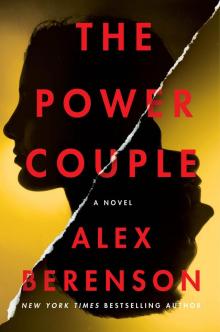 The Power Couple
The Power Couple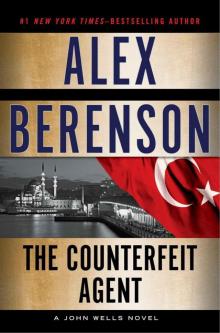 The Counterfeit Agent
The Counterfeit Agent The Midnight House
The Midnight House The Prisoner
The Prisoner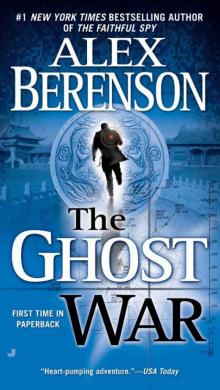 The Ghost War
The Ghost War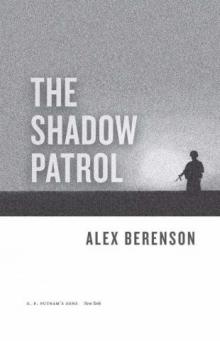 The Shadow Patrol jw-6
The Shadow Patrol jw-6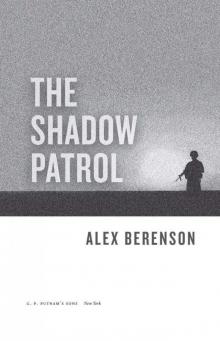 The Shadow Patrol
The Shadow Patrol The Deceivers
The Deceivers The Night Ranger jw-7
The Night Ranger jw-7 The Faithful Spy
The Faithful Spy The Prince of Beers (Kindle Single)
The Prince of Beers (Kindle Single)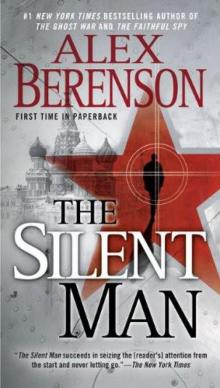 The Silent Man jw-3
The Silent Man jw-3 The Silent Man
The Silent Man The Wolves
The Wolves The Midnight House jw-4
The Midnight House jw-4 The Ghost Agent
The Ghost Agent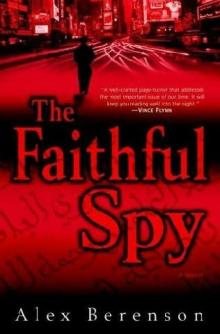 The Faithful Spy jw-1
The Faithful Spy jw-1 The Prince of Beers
The Prince of Beers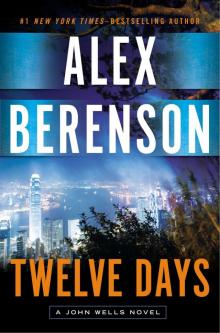 Twelve Days
Twelve Days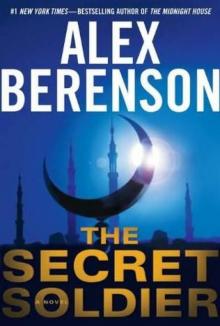 The Secret Soldier jw-5
The Secret Soldier jw-5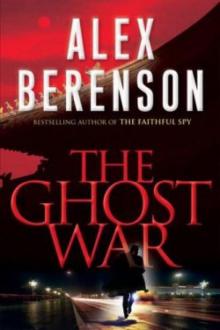 The Ghost War jw-2
The Ghost War jw-2 The Night Ranger
The Night Ranger